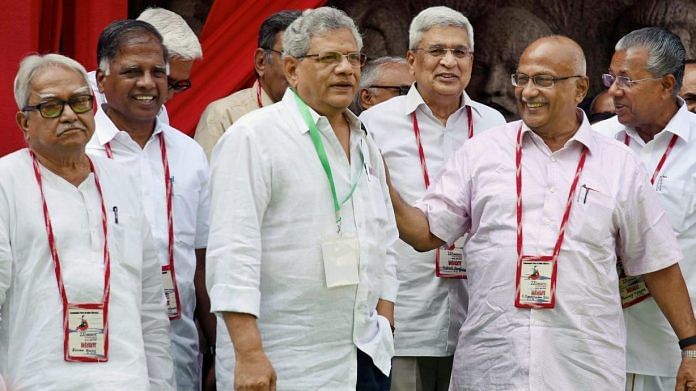The 17-member politburo has two women and as many Muslim members, but lacks Dalits. The CPI(M) politburo has not had a Dalit member since the party was founded 53 years ago.
Hyderabad: There are just two women and as many Muslims in the 17-member politburo elected by the CPI(M) at the end of its 22nd party congress Sunday. The party’s apex body also lacks Dalits, continuing a trend witnessed since the CPI(M) was founded 53 years ago.
For a party that claims to stand for people’s struggles, particularly those of the marginalised, the CPI (M) has often been criticised for keeping its politburo male- and upper-caste dominated. Its first woman politburo member, Brinda Karat, was only elected in 2005. Of the five general secretaries of the party so far, all have been upper-caste men.
The new faces in the politburo include Nilotpal Basu and Tapan Sen from West Bengal. The party’s 95-member central committee, its highest policymaking body, was also appointed at the congress.
The central committee unanimously elected general secretary Sitaram Yechury for a second term, ending a tense few months for him after his political line, regarding an understanding with the Congress party, was defeated at the committee’s meeting this January. However, disagreeing with the central committee, the CPI(M) party congress eventually passed an amended political resolution that leaves space for a political understanding with the Congress.
“We had a momentous congress, detailed discussions, and we have taken important decisions. If there is any message that should go to the rank-and-file and our class enemy, it is that the CPI(M) has emerged as a united party,” said Yechury after his re-election. “The main task today is to defeat this BJP government and for that all necessary measures will be undertaken.”
In fact, though much is being made of the party’s political line on account of the internal rift it has caused, this is effectively the line the CPI(M) has been following since 2003. The political resolution adopted that year ended CPI(M)’s treatment of the Congress as a political untouchable and left it open to allying with it.




1. Can one say that deliberations at the 22nd party congress of CPI(M) are relevant for ordinary citizens? Anti-BJP stance of the Left parties is perfectly okay since objective is to defeat BJP. Among the Left parties, CPI(M) a CPI are two Communist parties who differ in their approach but one thing which is common to both is that both parties are struggling to survive. After re-election of Sitaram Yechury as CPI(M) general secretary, difficult tasks are ahead. 2. On behalf of ordinary citizens, among whom are those who are CPI(M) sympathisers, question that needs to be asked is how relevant are CPI(M)’s policies today? One cannot forget that the party has been rejected by voters in West Bengal (WB) in two consecutive Assembly elections. Recently Assembly election in Tripura ended CPI(M)’s rule. In WB, the All India Trinamool Congress exposed hollowness of leftists’ ideology and in Tripura BJP’s rightist ideology succeeded in exposing leftists’ ideology. Here, it is worth remembering that in WB though it was the Left parties’ govt., it was the CPI(M) which dominated the whole show. 3. Citizens wish to know how the CPI(M) politburo views its chances, particularly in WB & Kerala in next year’s Lok Sabha election. Were there any deliberations in the 22nd party congress in this regard? Did the party undertake an assessment of its strengths? Hence my question today is this: Would CPI(M) leaders do a critical self-examination now that it is losing its voters everywhere? Basis of CPI(M)’s economic agenda is the state control of means of production. How relevant is such an agenda? Hence I think that such self-examination, without reconsideration of CPI(M’s basic economic agenda, would be of little assistance in revival of party.
Dalits feel insecure voting for parties who don’t give them representation, CPIM is a clear example of this. This is the reason why Mayawati’s BSP vote share in 2017 UP Elections remained intact. Her party gave some %age representation to dalits, much more than other parties.